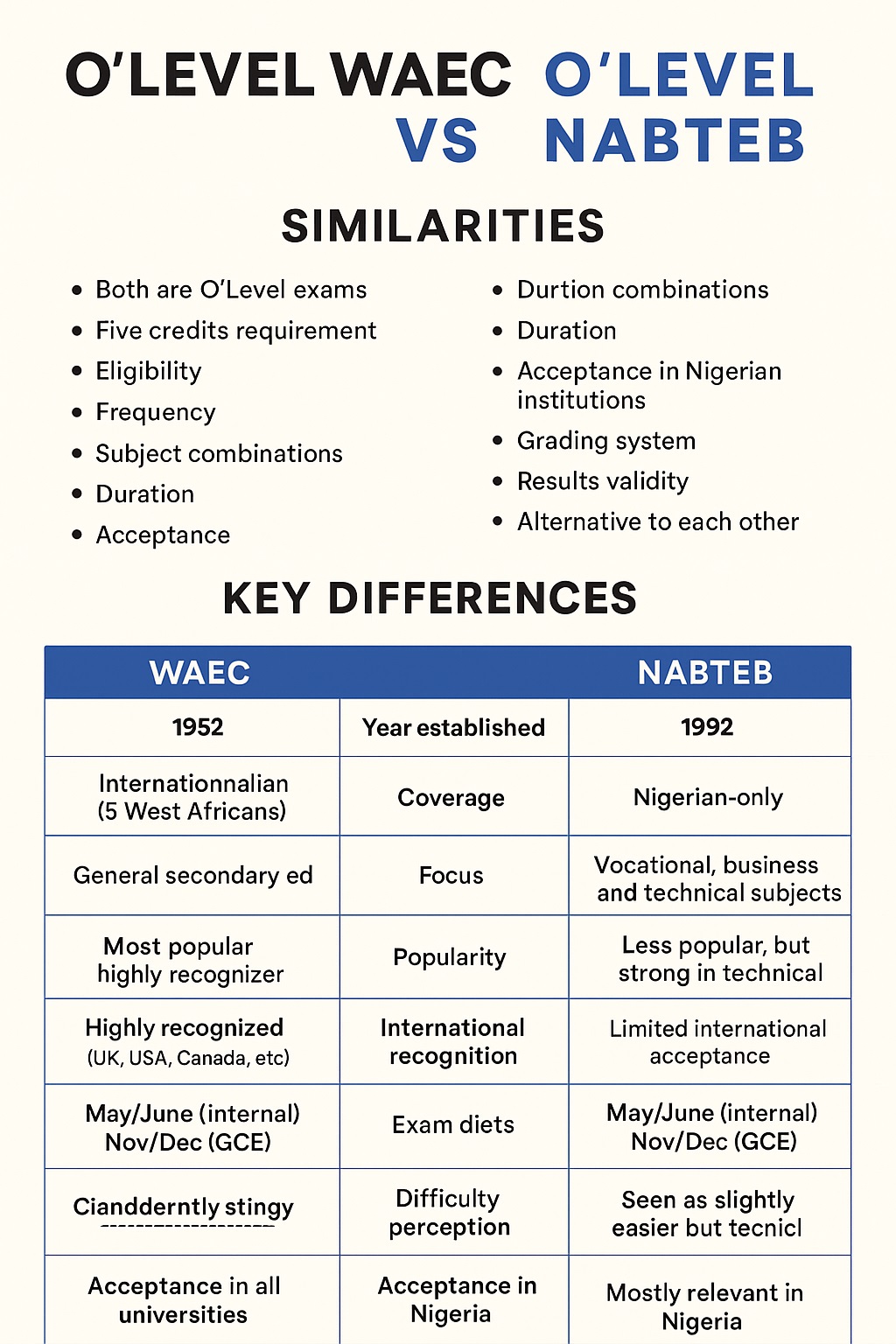In Nigeria, one of the biggest academic decisions secondary school leavers face is choosing the right O’Level examination to sit for. Two major options often come up—WAEC (West African Examinations Council) and NABTEB (National Business and Technical Examinations Board).
At first glance, both look the same. They are both O’Level qualifications, required for admission into Nigerian universities, polytechnics, and colleges of education. However, there are notable differences that every student must understand before making a choice.
This article breaks down everything you need to know about WAEC vs NABTEB—their history, purpose, similarities, differences, admission acceptance, and which one may be better for you.

What is WAEC?
The West African Examinations Council (WAEC) was established in 1952 as a regional examination body for Anglophone West Africa. It conducts standardized exams for five countries—Nigeria, Ghana, Sierra Leone, Liberia, and The Gambia.
In Nigeria, WAEC organizes two main types of exams:
-
WAEC SSCE (Internal) – For school candidates in SS3, taken between May/June every year.
-
WAEC SSCE (External) – For private candidates, taken between Nov/Dec every year.
A WAEC result is widely recognized across Nigeria, West Africa, and even internationally for both admission and employment opportunities.
What is NABTEB?
The National Business and Technical Examinations Board (NABTEB) was established in 1992 by the Nigerian government to focus on technical, vocational, and business-related education. Unlike WAEC, NABTEB is a Nigeria-only exam body and does not operate in other countries.
NABTEB conducts the following O’Level examinations:
-
NABTEB May/June – For school candidates (technical and general subjects).
-
NABTEB Nov/Dec (GCE) – For private candidates.
-
NABTEB Modular & Professional Exams – For students in vocational and technical training.
While NABTEB is accepted in Nigerian tertiary institutions, its international recognition is not as broad as WAEC’s.
Similarities Between WAEC and NABTEB
WAEC and NABTEB share many features that make them appear alike:
-
Both are O’Level exams – They test students’ readiness for higher education.
-
Five Credits Requirement – Both require at least five O’Level credits (including English and Mathematics) for university admission.
-
Eligibility – Both can be taken by school candidates (internal) and private candidates (external).
-
Frequency – Both are conducted twice a year (internal and external sessions).
-
Subject Combinations – Students write a mix of compulsory and elective subjects.
-
Duration – Both usually last between 6–8 weeks of examination.
-
Acceptance in Nigerian Institutions – Both results are used for JAMB registration and tertiary admission.
-
Grading System – Both use letter grading (A1–F9 in WAEC; A–F in NABTEB).
-
Results Validity – Both are valid for life, unlike JAMB UTME which expires after one year.
-
Alternative to Each Other – If a student fails in WAEC, NABTEB can be used, and vice versa.
Key Differences Between WAEC and NABTEB
Despite their similarities, there are important differences students should note:
| Feature | WAEC | NABTEB |
|---|---|---|
| Year Established | 1952 | 1992 |
| Coverage | International (5 West African countries) | Nigeria only |
| Focus | General secondary education | More vocational, business, and technical subjects |
| Popularity | Most popular and widely recognized | Less popular, but strong in technical fields |
| International Recognition | Highly recognized globally (UK, USA, Canada, etc.) | Limited international acceptance |
| Exam Diets | May/June (internal), Nov/Dec (GCE) | May/June (internal), Nov/Dec (GCE), plus modular exams |
| Difficulty Perception | Considered slightly tougher due to wider syllabus | Seen as slightly easier, but technical |
| Acceptance in Nigeria | Accepted by all universities, polytechnics, and colleges | Accepted by all Nigerian tertiary institutions |
| Employment Relevance | Accepted by both local and international employers | Mostly relevant in Nigeria |
| Exam Orientation | Academic-based | Skill and career-based (business/technical) |
Admission Requirements with WAEC and NABTEB
To use either exam for admission into Nigerian universities, candidates must have:
-
Minimum of 5 O’Level credits, including English Language and Mathematics.
-
Credits obtained in not more than two sittings.
-
Relevant subject combinations depending on the chosen course (e.g., Physics, Chemistry, Biology for Medicine).
👉 Both WAEC and NABTEB results can be combined with NECO, WAEC, or NABTEB itself (two sittings allowed).
Advantages of WAEC Over NABTEB
-
Wider International Recognition – WAEC is accepted globally, making it useful for students who wish to study abroad.
-
More Popular – Employers and institutions are more familiar with WAEC.
-
Broader Subject Scope – Covers both science, arts, and commercial subjects equally.
Advantages of NABTEB Over WAEC
-
Strong Technical Focus – Perfect for students interested in vocational or skill-based careers.
-
Flexible Exam Options – NABTEB offers modular exams that WAEC doesn’t.
-
Less Crowded – Since fewer students register for NABTEB, exam malpractice monitoring is often tighter, and marking is faster.
Which is Better: WAEC or NABTEB?
The answer depends on your career goals and academic plans:
-
If you want international opportunities (study abroad or global employment), WAEC is the better option.
-
If you are more inclined toward vocational/technical careers in Nigeria, NABTEB is highly beneficial.
-
For general Nigerian university admission, both are equally accepted, so it comes down to personal preference.
Both WAEC and NABTEB are valid O’Level exams that open the door to higher education in Nigeria. WAEC offers broader international recognition, while NABTEB provides a solid foundation for technical and vocational students.
The key is to choose the one that aligns with your future ambitions. If your dream includes studying abroad, go for WAEC. If you prefer a technical career path within Nigeria, NABTEB may be a smarter choice.
Whichever you choose, success depends more on your preparation, consistency, and determination than the exam body itself.